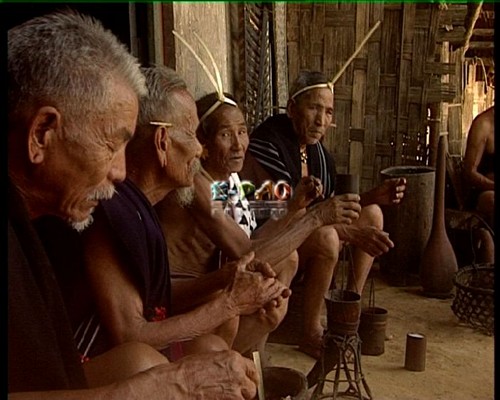Traditional administration of justice among the Zeliangrongs
- Part 4 -
Budha Kamei *

A scene from a Documentary Film by Ronel Haobam - 'The Zeliangrongs'
It is only six month among the Maram Nagas. Among the Kirgiz, they have the curious rule of not having the defendant take the oath but some other man of known probity who thereby assumes the criminal's sin.
Trial by ordeal is a judicial practice by which the guilt or innocence of the accused is determined by subjecting him to an unpleasant, usually dangerous experience. Classically, the test is one of life or death and proof of innocence is survival. In the ordeal an appeal is made to god to act as judge and the outcome of the trial is considered to be the judgment of god. Duilupmei, immersing in water is the easiest and common way to find out the righteous person or wrong doer.
Because one can find out easily the right or wrong on the moment of the swearing in ceremony. Five days ahead of the Duilupmei, Nampou in the presence of Pei elders will offer crush ginger (Gushuk) along with an egg (Charungbung) and prays to the water deity in the words: "as man could not decide please show us the righteous person."
For this ceremony the two quarrelling or disputing persons will swear before the gatherings including the village chief and elders of Pei by saying: "If I am the wrong doer I could not dive for a long time and float up soon. And if I am the righteous person I shall remain in water as stone for a long period." By swearing so they will plunge into the deep water of a nearby river or pond simultaneously. And the gathering people will watch and confirm the person who comes out first from the water.
It is believed that the righteous person will be empowered by god to remain inside the water for a longer period of time while the liar or the false claimer will be
prevented by god from doing so. Thus, the audience will examine the judgment of oath taking water deity.48 According to the result of the ordeal, the guilty person will not only lose or forfeit the property waged at the challenge, but also he is liable to pay the punitive fine inflicted by the Pei.
If the accused is found guilty, he will have to pay the compensation in the form of an animal (one buffalo/cow/mithun) to the righteous person in addition to the property forfeited and the punitive fine (Luwang Guarak) imposed.
The punitive fine and the property will go to the Pei.49 Moreover he has to offer a cock for consecration of the entire village. The oath and the ordeal serve as a means of voluntary submission of the accused to law. It is obeyed mainly because of the fear of the anger of the Supreme Being.
Within five days after the ordeal, a ritual called Sheng Phekmei is performed in which the Nampou or an elder of Pei with Ten Mhaimit, a kind of thatching grass purifies the whole village and after that he throws away the same outside the western gate of the village (Neikei Rou Raang) saying: "our village is not your home, go away your home is in the direction of sun set" (Neijun Neiba Keihang Heipuibam Khutathe).
And it is followed by Napkao, calling of paddy at the Peikai where the same priest offers a big and beautiful cock to Tingkao Ragwang for bountiful harvest. The victim is cooked and distributed a piece of chicken to each and every household of the village. The mother of the family with the mixture of the chicken (Loijan), cooked rice (Napmin) and salt (Tei), offers on the hearth stones where they the goddess of rice is supposed to dwell.
This is recognized as Napchanmei. The interpretation of the Sheng Phekmei ritual: Taking oath and ordeal in the name of deities (Rahta Jaihamna Sengding Dingmei) pollutes the whole village and it may have bad affect not only on man but also on the standing crops. Sheng Phekmei removes the evil effect of the ordeal. Napkao is the calling of paddy; it restores the previous condition of the crops as the priest on behalf of the village invokes to Tingkao Ragwang (who is the source of paddy) for plentiful harvest. It is carried out at the Peikai as it is the house of God.
Eating the victim means everyone is free from evil effect because it is cooked in the Peikai. Therefore, the Zeliangrong people always try to avoid this practice as much as possible in village court cases they prefer to pay fine. Generally, these oaths and ordeals are resorted to only in the difficult cases when all other means fail to materialize.
The oath and ordeal system is also found among the Kukis of Manipur. The method of oath and ordeal may be dissimilar from one community to another but the objective is the same.
Concluded
* Budha Kamei wrote this article for The Sangai Express
This article was posted on August 26, 2013
* Comments posted by users in this discussion thread and other parts of this site are opinions of the individuals posting them (whose user ID is displayed alongside) and not the views of e-pao.net. We strongly recommend that users exercise responsibility, sensitivity and caution over language while writing your opinions which will be seen and read by other users. Please read a complete Guideline on using comments on this website.







